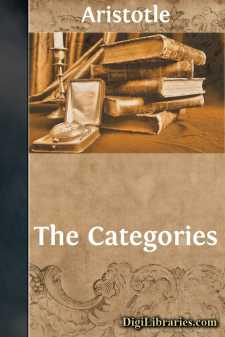Categories
- Antiques & Collectibles 13
- Architecture 36
- Art 48
- Bibles 22
- Biography & Autobiography 813
- Body, Mind & Spirit 142
- Business & Economics 28
- Children's Books 17
- Children's Fiction 14
- Computers 4
- Cooking 94
- Crafts & Hobbies 4
- Drama 346
- Education 46
- Family & Relationships 57
- Fiction 11829
- Games 19
- Gardening 17
- Health & Fitness 34
- History 1377
- House & Home 1
- Humor 147
- Juvenile Fiction 1873
- Juvenile Nonfiction 202
- Language Arts & Disciplines 88
- Law 16
- Literary Collections 686
- Literary Criticism 179
- Mathematics 13
- Medical 41
- Music 40
- Nature 179
- Non-Classifiable 1768
- Performing Arts 7
- Periodicals 1453
- Philosophy 64
- Photography 2
- Poetry 896
- Political Science 203
- Psychology 42
- Reference 154
- Religion 513
- Science 126
- Self-Help 84
- Social Science 81
- Sports & Recreation 34
- Study Aids 3
- Technology & Engineering 59
- Transportation 23
- Travel 463
- True Crime 29
Sort by:
by:
Aristotle
Part 1 Things are said to be named 'equivocally' when, though they have a common name, the definition corresponding with the name differs for each. Thus, a real man and a figure in a picture can both lay claim to the name 'animal'; yet these are equivocally so named, for, though they have a common name, the definition corresponding with the name differs for each. For should any one...
more...
by:
Henry P. Talbot
PART I INTRODUCTION SUBDIVISIONS OF ANALYTICAL CHEMISTRY A complete chemical analysis of a body of unknown composition involves the recognition of its component parts by the methods of !qualitative analysis!, and the determination of the proportions in which these components are present by the processes of !quantitative analysis!. A preliminary qualitative examination is generally indispensable, if...
more...
CHAPTER I—THE FEUDAL AGE It is a very common thing now-a-days to meet people who are going to "China," which can be reached by the Siberian railway in fourteen or fifteen days. This brings us at once to the question—What is meant by the term China? Taken in its widest sense, the term includes Mongolia, Manchuria, Eastern Turkestan, Tibet, and the Eighteen Provinces, the whole being...
more...
BLESSEDNESS AND PRAISE 'Blessed is the man that walketh not in the counsel of the ungodly, nor standeth in the way of sinners, nor sitteth in the seat of the scornful. 2. But his delight is in the law of the Lord.' —PSALM i. 1, 2. 'Let every thing that hath breath praise the Lord. Praise ye the Lord.'—PSALM cl. 6. The Psalter is the echo in devout hearts of the...
more...
by:
Bernard Glueck
When, in 1810, Franz Joseph Gall said: “The measure of culpability and the measure of punishment can not be determined by a study of the illegal act, but only by a study of the individual committing it,” he expressed an idea which has, in late years, come to be regarded as a trite truism. This called forth as an unavoidable consequence a more lively interest on the part of various social agencies...
more...
CHAP. I. As in all cases of great and valuable inventions in science and art the English lay claim to the honor of having first discovered that of Photogenic drawing. But we shall see in the progress of this history, that like many other assumptions of their authors, priority in this is no more due them, then the invention of steamboats, or the cotton gin. This claim is founded upon the fact that in...
more...
by:
William Tyndale
The first Chapter. The word of the lord came unto the prophet Jonas the son of Amithai saying: rise and get thee to Nineve that great city and preach unto them, how that their wickedness is come up before me. And Jonas made him ready to flee to Tharsis from the presence of the lord, and gat him down to Joppe, and found there a ship ready to go to Tharsis, and paid his fare, and went aboard, to go with...
more...
by:
Barack Obama
: My fellow citizens: I stand here today humbled by the task before us, grateful for the trust you have bestowed, mindful of the sacrifices borne by our ancestors. I thank President Bush for his service to our nation, as well as the generosity and cooperation he has shown throughout this transition. Forty-four Americans have now taken the presidential oath. The words have been spoken during rising...
more...
by:
Frederic Bastiat
Capital and Interest. My object in this treatise is to examine into the real nature of the Interest of Capital, for the purpose of proving that it is lawful, and explaining why it should be perpetual. This may appear singular, and yet, I confess, I am more afraid of being too plain than too obscure. I am afraid I may weary the reader by a series of mere truisms. But it is no easy matter to avoid this...
more...
by:
Benjamin Jowett
INTRODUCTION AND ANALYSIS. The genuineness of the Laws is sufficiently proved (1) by more than twenty citations of them in the writings of Aristotle, who was residing at Athens during the last twenty years of the life of Plato, and who, having left it after his death (B.C. 347), returned thither twelve years later (B.C. 335); (2) by the allusion of Isocrates (Oratio ad Philippum missa, p.84: To men...
more...











